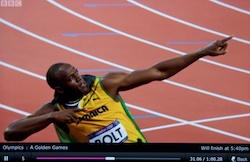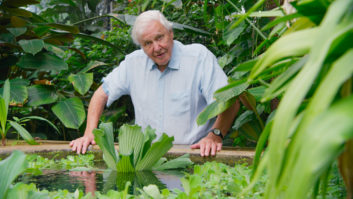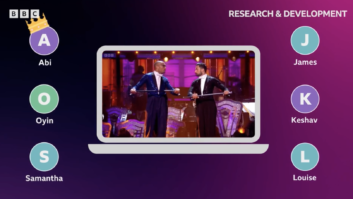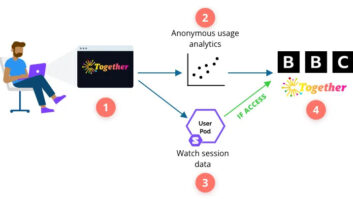
The Olympics was the BBC’s most successful online event ever, attracting a record-breaking total of 55m global browsers to BBC Sport online throughout the Games. This mirrored the BBC’s record Olympic TV reach, across both linear TV channels and Red Button, with over 51.9m viewers in the UK – the largest TV audience reach for a major event for at least 10 years. Of the 55m total, 37m browsers came from the UK, with an average of 9.5m global and 7.1m UK browsers per day, easily breaking all previous records (the previous record for a single day was 7.4m global and 5.7m UK). The system saw 106m requests for BBC Olympic video content across all online platforms, more than double that seen for any previous events. It was also the first truly mobile games, with 9.2m UK mobile browsers to the BBC’s Olympics coverage (2.8m on the peak day), making up 34% of all daily browsers to BBC’s Olympic coverage (40% at weekends/30% on weekdays), and 12m requests from mobiles for video throughout the Games – there were 1.9m downloads of the BBC’s Olympics mobile app for iOS and Android smartphones. With so many sports happening at once, some viewers followed several streams at once on TV, mobile and tablet. Mobile consumption increased steadily from the morning to a plateau in the early afternoon, before dipping away in conjunction with TV viewing in the evening. “PC usage maxes out during the week at lunchtime and during mid-afternoon peak Team GB moments. Mobile takes over around 6pm as people leave the office but still want to keep up to date with the latest action. Tablet usage reaches a peak at around 9pm: people using them as a second screen experience as they watch the Games on their TVs, and also as they continue to watch in bed,” explained Cait O’Riordan, Head of Product, BBC Sport and London 2012. On the button The BBC Red Button service attracted 23.7m viewers to the 24 SD, HD and Freeview streams throughout the Games, with every single stream seeing at least 100,000 viewers. “Audiences quickly grew accustomed to being able to switch between up to 24 streams. In between the peaks of Team GB medal moments, our data clearly shows people moving across streams to check out a whole host of different events,” revealed O’Riordan. Over a 24-hour period on the busiest Olympic days, total traffic to bbc.co.uk exceeded that for the entire BBC coverage of the FIFA World Cup 2010 matches. On the busiest day, the BBC delivered 2.8 petabytes of data, with the peak traffic moment occurring when Bradley Wiggins won a Gold medal in the cycling time trial, with over 700 Gigabits per second. Streaming quality was the highest the BBC has ever delivered online, averaging over 1 megabit per second. However, BBC Sport’s online commitment was considerable, including a page for every athlete, country, sport and venue; 2,500 hours of coverage; and up to 24 HD live streams, plus video on demand, ensuring audiences didn’t miss a moment of the action. By making every sport available across PC, mobile, tablet and connected TV, viewers could keep up to date with the action any time and any place. BBC Sport also launched a new live interactive video player, which enabled viewers to switch between live HD video coverage, navigate to session highlights, and discover more with live data, statistics and information, while watching the action. Of the106m requests for video throughout the Games, 62m were for live streams, 8m for on-demand streams and 35m for clips, compared to the previous highs of 32m for the Beijing Games and 38m for the 2010 World Cup. New features such as chapter markings received an average 1.5 million clicks per day, with people using them to navigate instantly to key moments. The top five most-requested events from Olympic live video streams on BBC Sport online included: Andy Murray and Serena Williams winning the Tennis Singles Finals, Bradley Wiggins winning the Men’s Cycling Time-Trial and Athletics Heats including Jessica Ennis in the Heptathlon. Production process Production of video for its digital offering involved two parallel processes. When the event started, the trackside coverage was sent via the BBC’s gallery at the International Broadcast Centre in the Olympic Park to BBC Sport’s new production HQ in Salford, where it was prepared for different devices. This encoded video was then sent to its content distribution network (Akamai and Limelight) for delivery. At the same time, data about the event was sent by Olympics Broadcasting Services to the BBC’s database. Key event statistics, schedule information, and highlights logged by trackside observers flowed into its content store. The BBC also had a team of loggers in Salford who augmented that data to make sure all the key moments were marked – concentrating on British athletes. Once video was loaded into the player, it recognised which event was playing and displayed the appropriate data from the database. As the event went on, the logged data from OBS enabled the BBC to create chapter markers, so audiences watching on PC could instantly rewind to any key moments they missed, or wanted to watch again. The future O’Riordan hopes that its investment in the digital Olympics will ensure that the BBC can deliver great experiences for years to come. “The infrastructure and video delivery systems we have put in for the games will be used for future coverage for both BBC Sport and the rest of the BBC. And all our Olympics video content will be able to watch online on the BBC Sport website until January 13th,” when rights revert to the IOC. “We also hope to leave a lasting legacy in terms of audiences to BBC online. Over the course of the Olympics we attracted huge numbers of new users to our BBC Sport interactive services and we hope that having enjoyed our digital video coverage they will be back for other events the BBC cover in the future.” For more on the figures, have a look at O’Riordan’s blog post. By David Fox







